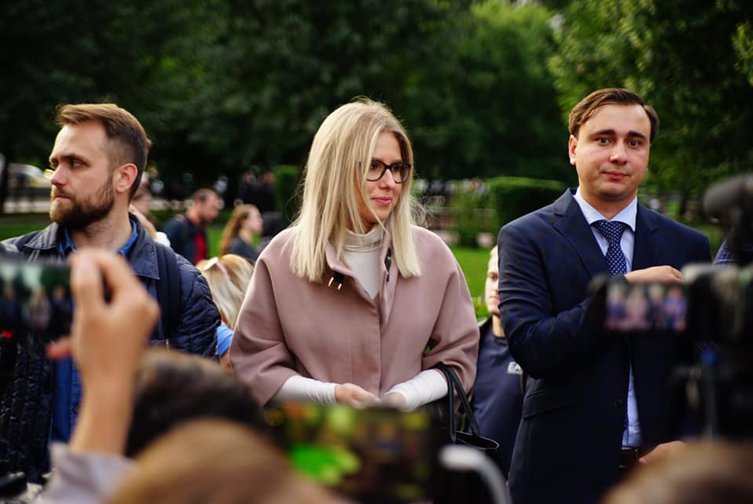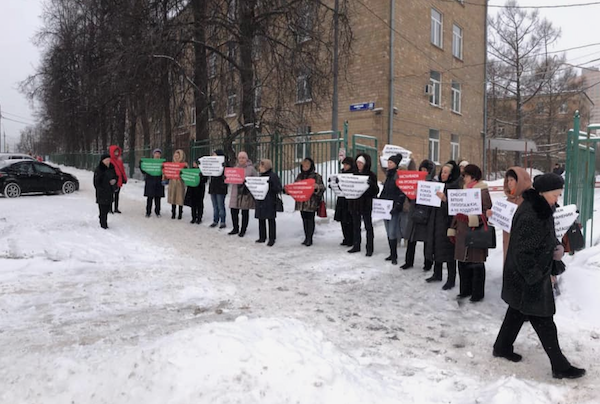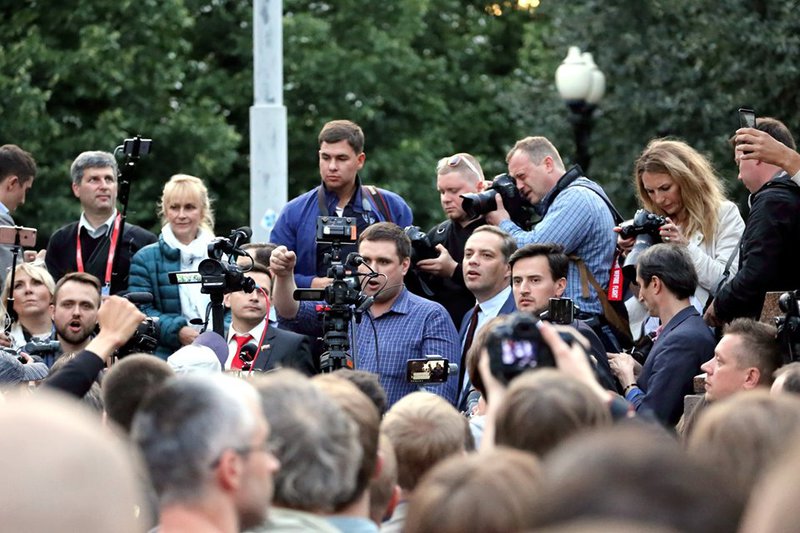In the Russian capital, administrative wrangling by the Moscow authorities has provoked mobilisation from below – capitalising on long-held discontent by city residents. Thanks to Open Democracy-Russia, LeftEast is able to share the following interview with Alexander Zamyatin, municipal deputy in Zyuzino, Moscow. He is chief editor of Mirror.

In defiance of expectations, this year’s elections to the Moscow City Council have turned into a chain of political scandals and street protests. And in response, large-scale protest actions have been held in the city centre since mid-July. Public meetings with independent candidates running for the council on 27 July and 3 August ended in protesters being detained en masse (1,373 people on 27 July and 1,001 people on 3 August, according to OVD-Info), paralysing police stations and district courts.
The authorities are calling these events “mass riots”, accusing the opposition of attempting a “state coup” and trying to scare Muscovites with chaotic arrests, interrogations and searches. For many city residents, this counter-campaign doesn’t look particularly convincing: the contradictions of the Russian regime lie at the core of these protests, and exceed the ambitions of individual candidates.
The protesters’ principal demand is to allow candidates, who aren’t aligned with either the Moscow Mayor’s Office or political parties, to participate in the city council elections. At the beginning of July, the city’s district election commissions refused to register two dozen independent candidates according to a series of absurd reasons. This provoked disbelief from Muscovites. According to the commissions, some registration documents were missing signatures from handwriting analyses. Other commissions made intentional mistakes when checking the personal information of supporting signatories against Interior Ministry databases. And others simply made new, incorrect documents.
Appeals at higher election commissions has only made supporters more angry. As of today, neither the Moscow City Electoral Commission, nor the Central Electoral Commission have approved the status of any of the independent candidates.
Many Moscow residents have come to see the advantages of political representation. Even the minimal powers of district councillors helped, in many cases, to change the balance of power in the standoff between city officials and residents.
Commentators note that a broad social base has emerged in support of this protest, which distinguishes it from the 2017 anti-government protests or last year’s protests against pension reform. The very fact of electoral falsifications is unlikely to surprise anyone in Russia, which suggests that a certain tension and dissatisfaction are behind this protest. Indeed, it’s not hard to find the roots of this resentment in the city’s political life of recent years.
The prologue to the increasingly broad realisation that Muscovites need their own representatives in the city council first came in 2017, when independent district councillors were elected in dozens of city neighbourhoods. In the two years since, many Moscow residents have come to see the advantages of political representation. Even the minimal powers of district councillors helped, in many cases, to change the balance of power in the standoff between city officials and residents. For example, in the district of Zyuzino, where I am a councillor, independent councillors managed to stop the demolition of a maternity hospital, introduce a free rail replacement scheme during metro works and reallocatemillions of roubles from repeat road construction to building playgrounds for children and athletics pitches.
In several districts, local councillors practically took on the role of city councillors while current deputies either hid from their voters or openly stood with the Moscow city government, as in the case of planned property development at the enormous Bitsa park. Independent local councillors gave rise to the teams of non-affiliated candidates to the city council in 2019, such as Ilya Yashin, Konstantin Yankauskas, Yulia Galyamina and others.

This work on the local level made a crucial contradiction of Russia’s political regime all too clear – the lack of citizen representation in power. If we count the pseudo-independent deputies from the “My Moscow” movement, then more than 80% of the seats (38 out of 45) in the Moscow City Council are held by representatives of United Russia. Yet even according to the most conservative polls, United Russia’s approval rating is no higher than 37% in Moscow. What’s more, the overall rating for political parties represented in city government is 66%, according to those same polls. This means that at least a third of Moscow voters are not represented in the city council. It was natural, then, that opposition candidates with grassroots support – and a real chance at power – would emerge. This public tension surfaced precisely at the point where, according to the authorities’ plans, it was supposed to be shut down – in the collection of signatures for registering candidates.
The law states that there are two ways of getting on the ballot to the Moscow City Council. The first involves running with one of the four parties represented. But it’s no secret that the parties have their candidate lists approved by the Mayor’s Office, and so it’s rare to find an independent local politician there.
The second option is to run as an independent. To register as an independent, you need to collect a number of signatures equal to three percent of eligible voters in your district in a 30-day period. At first glance, this doesn’t look like very many, but in reality the so-called “municipal filter” is a practically insurmountable barrier. A candidate needs to collect, on average, 200 signatures a day.
The procedures for processing these signatures are such that the election commission can question practically every comma: you have to copy in the personal information of possible voters to a specific document by hand, and do it according to rules that aren’t always compatible with common sense. For example, when you copy in a date of birth or address, you cannot use typical writing conventions in Russian – and if you do, then there’s grounds to recognise a signature as invalid. Moreover, all signatories have to present their passport information as part of the document, which demands a certain level of trust both towards the candidate and the person collecting the signatures.
Obviously, a candidate by themselves cannot physically collect this amount of signatures, even if voters lined up in front of them. Instead, you have to draw on the help of volunteers or campaign personnel, who can collect signatures for the candidate. Yet each person involved in collecting signatures has to complete a series of formal documents and be authorised by a notary.
At least a third of Moscow voters are not represented in the city council. It was natural, then, that opposition candidates with grassroots support – and a real chance at power – would emerge
The actual rate of collecting signatures in Moscow in summer – half-empty and highly depoliticised – is lower than all expectations. On average, a single collector brings in five signatures a day. This means that an election team should send out 40 collectors a day. All of them need to be registered, trained and armed with the right documents – and each of these preparation stages needs a whole department in the election committee. For example, candidate Konstantin Yankauskas had 108 collectors and 12 staff members on his committee. The cost of the campaign for collecting signatures for independent candidates varied from one to three million roubles (£12,500-£38,000).
But the process of collecting signatures, originally conceived as financial and organisational barriers, has unexpectedly turned into a mobilising factor for grassroots support. The people who came up with the “municipal filter” did not consider the possibility that residents of an electoral district could demonstrate horizontal self-organisation in support of a single candidate. And this is precisely what has happened in support of the majority of independent candidates who managed to collect the necessary signatures. Neighbourly ties and communication tactics developed in local campaigns contributed to collecting signatures for registering candidates who are running for city council with the same local agendas.
As a result, in the course of a month, hundreds of collectors made thousands of contacts with potential voters, attracting the attention of millions of residents in courtyards and apartment blocks. For those people who ran around their neighbours asking them to sign in support of independent candidates, and those who gave their signatures, the level of engagement in this battle for political representation is higher than any other civic campaign. (In the course of this work, saturated in social ties, several people have even struck up romantic relationships.)

Is it worth being surprised at the anger in reaction to the city electoral commissions which started invalidating signatures en masse and refusing registration for absurd reasons? Hundreds of signatories have written to the electoral commissions to have their signatures recognised as valid. “According to our information, you don’t exist,” came the reply.
Political consultants working for the Moscow Mayor’s Office poured more oil on the fire when they decided to run pro-government candidates as independents, while hiding their ties with United Russia. These candidates, just like the independents, had to collect signatures in order to register. But because these candidates have no electoral base beyond “administrative resources” (e.g. forcing public sector workers to vote), they had to imitate a signature campaign, even with the enormous budgets at their disposal. Afterwards, pro-government candidates presented campaign accounts that suggested they spent tens of thousands of roubles or even less than that on collecting signatures. For those supporting independent candidates, the instant registration of all pro-government candidates erased any lingering doubt that the electoral commissions were prejudiced.
Clearly, Moscow’s ruling elite were not ready for a scenario whereby independent candidates could collect the right number of signatures, especially with this level of popular support. The commissions had to refuse opposition candidates on the most ridiculous grounds, which broke the patience of thousands of voters. People were openly refused the chance of political representation, but many of them were sufficiently consumed by the political process to realise the extent of this injustice. Thus, the demand for political representation instantly guaranteed an unprecedented number of supporters for the so-called “unsanctioned” protests, where the risk of being jailed for 48 hours, and then receiving 30 days of administrative arrest, was high.
The process of collecting signatures, originally conceived as financial and organisational barriers, has unexpectedly turned into a mobilising factor for grassroots support
Here, the only way of avoiding an escalation of the protest was to compromise, and register at least a few independent candidates. Instead, the Moscow Mayor’s Office handed the reins to law enforcement, which quickly isolated the independent candidates through apartment searches and administrative arrests. At that moment, when the authorities resorted to openly terrorising city residents in order to try and calm moods at the street protests, the campaign for permitting independent candidates moved to a different level: while dozens of young people are facing criminal charges for protesting, it will be impossible to hold a normal conversation about the city’s problems.
Almost all protest leaders are now under arrest. It’s hard to predict how the situation will develop, and the format of the next protest on 10 August is yet to be confirmed. But it’s already clear that the movement in support of independent candidates is increasingly less able to maintain its own agenda – and now has to defend itself from the brutal reaction of Russia’s ruling elite.

